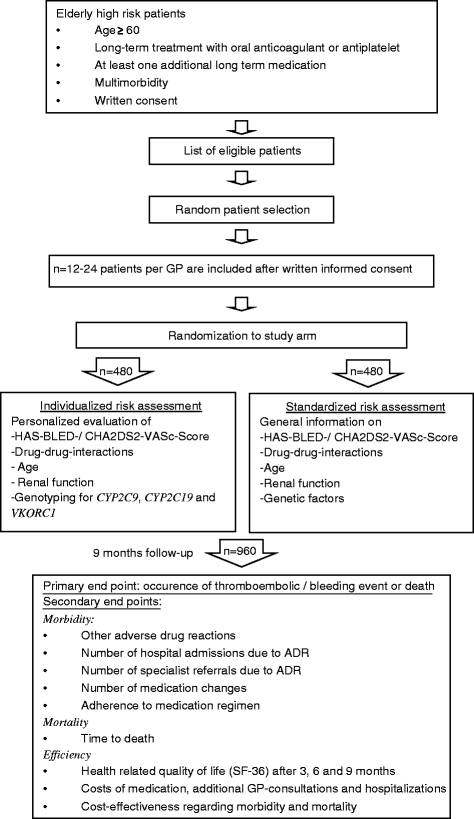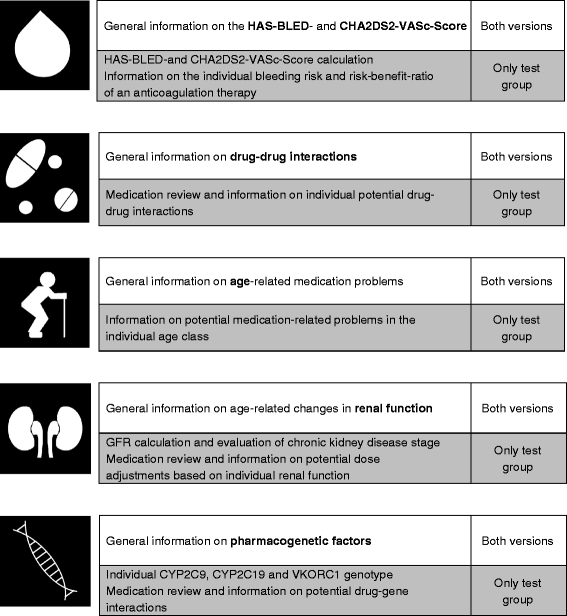Individualized versus standardized risk assessment in patients at high risk for adverse drug reactions (IDrug) - study protocol for a pragmatic randomized controlled trial
- PMID: 27112273
- PMCID: PMC4845354
- DOI: 10.1186/s12875-016-0447-6
Individualized versus standardized risk assessment in patients at high risk for adverse drug reactions (IDrug) - study protocol for a pragmatic randomized controlled trial
Abstract
Background: Elderly patients are particularly vulnerable to adverse drug reactions, especially if they are affected by additional risk factors such as multimorbidity, polypharmacy, impaired renal function and intake of drugs with high risk potential. Apart from these clinical parameters, drug safety and efficacy can be influenced by pharmacogenetic factors. Evidence-based recommendations concerning drug-gene-combinations have been issued by international consortia and in drug labels. However, clinical benefit of providing information on individual patient factors in a comprehensive risk assessment aiming to reduce the occurrence and severity of adverse drug reactions is not evident. Purpose of this randomized controlled trial is to compare the effect of a concise individual risk information leaflet with standard information on risk factors for side effects.
Methods/design: The trial was designed as a prospective, two-arm, randomized, controlled, multicenter, pragmatic study. 960 elderly, multimorbid outpatients in general medicine are included if they take at least one high risk and one other long-term drug (polymedication). As high risk "index drugs" oral anticoagulants and antiplatelets were chosen because of their specific, objectively assessable side effects. Following randomization, test group patients receive an individualized risk assessment leaflet evaluating their personal data concerning bleeding- and thromboembolic-risk-scores, potential drug-drug-interactions, age, renal function and pharmacogenetic factors. Control group patients obtain a standardized leaflet only containing general information on these criteria. Follow-up period is 9 months for each patient. Primary endpoint is the occurrence of a thromboembolic/bleeding event or death. Secondary endpoints are other adverse drug reactions, hospital admissions, specialist referrals and medication changes due to adverse drug reactions, the patients' adherence to medication regimen as well as health related quality of life, mortality and resulting costs.
Discussion: Despite extensive evidence of risk factors for adverse drug reactions, there are few prospective trial data about an individualized risk assessment including pharmacogenetic information to increase patient safety. By conducting a health economic analysis, we will evaluate if the application of an individualized drug therapy in daily routine is cost-effective.
Trial registration: German Clinical Trials Register: DRKS00006256 , date of registration 09/01/15.
Keywords: ADR risk assessment; Adverse drug reaction; Clinical decision support system; Drug interaction; Elderly; Individualized medicine; Pharmacogenetics; Polymedication.
Figures


References
-
- Meier F, Maas R, Sonst A, Patapovas A, Muller F, Plank-Kiegele B, Pfistermeister B, Schoffski O, Burkle T, Dormann H. Adverse drug events in patients admitted to an emergency department: an analysis of direct costs. Pharmacoepidemiol Drug Saf. 2015;24(2):176–186. doi: 10.1002/pds.3663. - DOI - PubMed
-
- Leendertse AJ, Egberts AC, Stoker LJ, van den Bemt PM, Group HS. Frequency of and risk factors for preventable medication-related hospital admissions in the Netherlands. Arch Intern Med. 2008;168(17):1890–1896. - PubMed
-
- Schneeweiss S, Hasford J, Gottler M, Hoffmann A, Riethling AK, Avorn J. Admissions caused by adverse drug events to internal medicine and emergency departments in hospitals: a longitudinal population-based study. Eur J Clin Pharmacol. 2002;58(4):285–291. doi: 10.1007/s00228-002-0467-0. - DOI - PubMed
Publication types
MeSH terms
Associated data
LinkOut - more resources
Full Text Sources
Other Literature Sources
Medical
Research Materials

